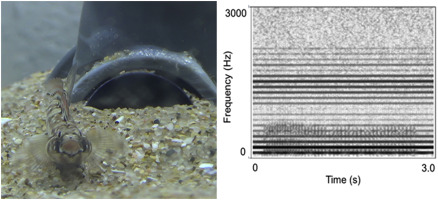Environmental Pollution ( IF 8.9 ) Pub Date : 2017-11-14 , DOI: 10.1016/j.envpol.2017.11.003 Karen de Jong , M. Clara P. Amorim , Paulo J. Fonseca , Clive J. Fox , Katja U. Heubel

|
There are substantial concerns that increasing levels of anthropogenic noise in the oceans may impact aquatic animals. Noise can affect animals physically, physiologically and behaviourally, but one of the most obvious effects is interference with acoustic communication. Acoustic communication often plays a crucial role in reproductive interactions and over 800 species of fish have been found to communicate acoustically. There is very little data on whether noise affects reproduction in aquatic animals, and none in relation to acoustic communication. In this study we tested the effect of continuous noise on courtship behaviour in two closely-related marine fishes: the two-spotted goby (Gobiusculus flavescens) and the painted goby (Pomatoschistus pictus) in aquarium experiments. Both species use visual and acoustic signals during courtship. In the two-spotted goby we used a repeated-measures design testing the same individuals in the noise and the control treatment, in alternating order. For the painted goby we allowed females to spawn, precluding a repeated-measures design, but permitting a test of the effect of noise on female spawning decisions. Males of both species reduced acoustic courtship, but only painted gobies also showed less visual courtship in the noise treatment compared to the control. Female painted gobies were less likely to spawn in the noise treatment. Thus, our results provide experimental evidence for negative effects of noise on acoustic communication and spawning success. Spawning is a crucial component of reproduction. Therefore, even though laboratory results should not be extrapolated directly to field populations, our results suggest that reproductive success may be sensitive to noise pollution, potentially reducing fitness.
中文翻译:

噪音会影响鱼的声音交流和随后的产卵成功
人们非常担心海洋中人为噪声水平的提高可能会影响水生动物。噪声会在物理,生理和行为上影响动物,但最明显的影响之一是对声音传播的干扰。声音交流通常在生殖相互作用中起着至关重要的作用,并且已经发现800多种鱼类可以进行声音交流。关于噪音是否会影响水生动物繁殖的数据很少,而与声音传播有关的数据则很少。在这项研究中,我们测试了连续噪声对两种密切相关的海洋鱼类求偶行为的影响:两种斑点的虾虎鱼(Gobiusculus flavescens)和彩绘虾虎鱼(Pomatoschistus pictus))在水族箱实验中。这两个物种在求爱时都使用视觉和听觉信号。在两斑点的虾虎鱼中,我们采用了重复测量的设计,以相同的顺序交替测试了噪声和控制处理中的同一个人。对于彩绘的虾虎鱼,我们允许雌性产卵,但不包括重复测量设计,但可以测试噪声对雌性产卵决策的影响。两种动物的雄性都减少了听觉上的爱慕,但是与对照相比,只有涂漆的虎虾在噪声处理中也表现出更少的视觉爱慕。涂有油漆的虾虎鱼在噪声处理中产卵的可能性较小。因此,我们的结果为噪声对声音传播和产生成功的负面影响提供了实验证据。产卵是繁殖的重要组成部分。所以,



























 京公网安备 11010802027423号
京公网安备 11010802027423号